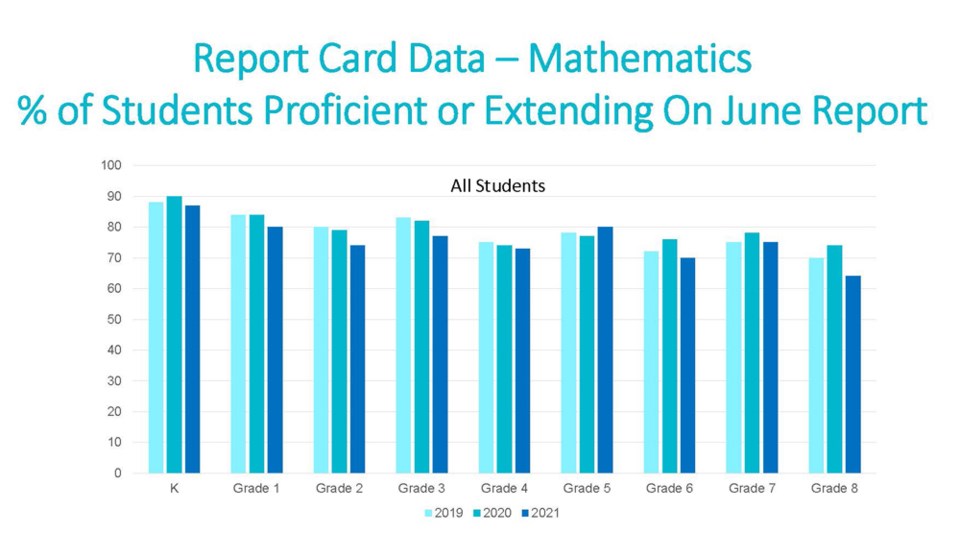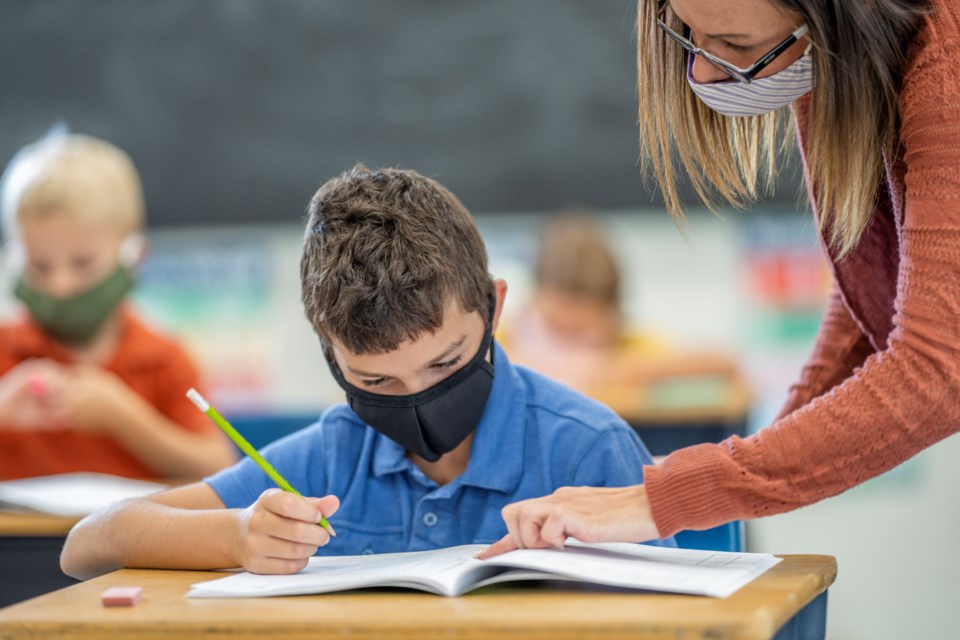How have three pandemic school years affected student learning in New Westminster?
The in-a-nutshell answer: The effects of COVID-19 have taken a toll, but the drop in student outcomes hasn’t been dramatic.
The issue came to the table at the New Westminster school board’s education committee meeting Feb. 8. Trustees heard a presentation on student learning outcomes based on data from a variety of sources – including report cards, Foundation Skills Assessments (FSAs) and student learning surveys.
Maureen McRae-Stanger, the school district’s director of instruction, learning and innovation, said report card data for the past three years shows a general downward trend in both English language arts and mathematics.
“It’s not surprising to see this type of data,” McRae-Stanger said. “We think about COVID, and we think about some of the interruption of learning; we think about some of the absenteeism; we think about students shifting to online.”

Student learning on report cards is now assessed on a four-stage scale starting at “emerging,” followed by “developing,” “proficient” and “extending.” The goal for the school district is to have all students reach “proficient” (defined as a “complete understanding of the concepts and competencies relevant to the expected learning”) by their final report in June.
Report card results for 2019, 2020 and 2021 show the majority of students from kindergarten to Grade 8 were still in the “proficient” or “extending” categories by the end of the school year.
Most of the rest, McRae-Stanger said, were in the “developing” category, heading towards “proficient.” Only a small percentage – from 5% to 10%, depending on the grade level – remained in the “emerging” category.
“In general, we’re actually doing remarkably well over the past three years,” McRae-Stanger said.
New Westminster FSA results remain strong
The school district has also continued to see good results from the Foundation Skills Assessment tests, written by students across B.C. in grades 4 and 7.
New Westminster’s Grade 4 results showed the majority of students ranked as “on track” or “extending” – 86% for reading comprehension (compared to 83% provincewide); 97% for writing (92% provincewide); and 78% numeracy (72% provincewide).
“I’m really impressed with our Grade 4 students for FSA in this past year, through all the challenges and impacts of COVID,” McRae-Stanger said.
The Grade 7 results also bested B.C. numbers for reading comprehension (81% compared to 78%) and writing (93% compared to 85%), lagging only in numeracy (64% compared to 68%).
McRae-Stanger said the district was impressed with those results, given the challenges around pandemic learning, but still wants to continue its focus on numeracy.
How students are feeling
The COVID-19 pandemic can also be seen at work in the results of student learning surveys. School districts across B.C. conduct annual surveys of students in grades 4, 7, 10 and 12 to gauge their sense of belonging, safety and connection.
“We know that a sense of safety and connection allows students to actually do better, intellectually and academically,” McRae-Stanger said.
When it comes to questions such as “Is school a place you feel you belong?” and “Do you feel welcome at your school?”, New Westminster’s numbers have flatlined or declined over previous years – with the largest drops among high school students.
McRae-Stanger said the district knows it needs to focus on students’ sense of belonging in school but added the drop was not unexpected – in light of factors such as remote learning, the switch to a quarter system for the high school, and the grouping of students into cohorts.
“When we think about the last two years of COVID, it’s hard to feel a sense of belonging in your school when you’re not there all the time,” she said.
Another key question, “How many adults at school care about you?” has also seen a downward slide. The percentage of students responding with “two or more” has gone down at all grade levels, with the biggest decline among Grade 12s.
“Definitely, in COVID, it has been more challenging to have those stronger adult connections,” McRae-Stanger said, noting the pandemic has limited things like clubs and after-school sports, where students typically develop stronger relationships with adults.
“It’s going to continue to be a focus for us.”
Want to know more?
To see a full report about student learning, including graphs, charts and more data, you can find the presentation online in the agenda from the Feb. 8 education meeting.
Follow Julie MacLellan on Twitter @juliemaclellan.
Email Julie, [email protected].




